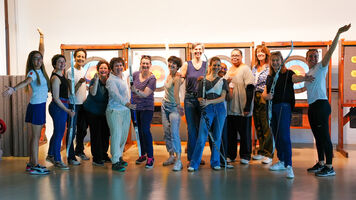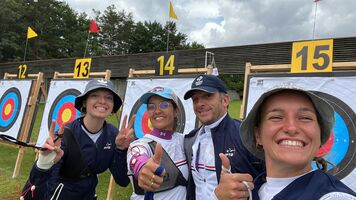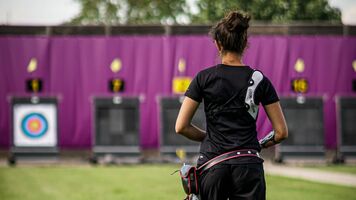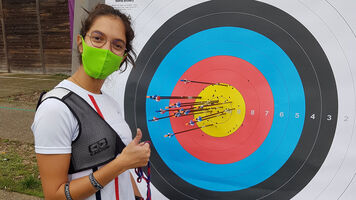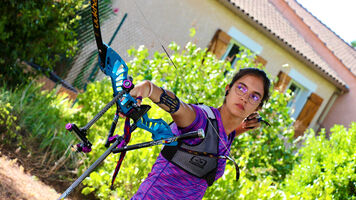Audrey’s blog: Isolation mentality and dealing with the competition break
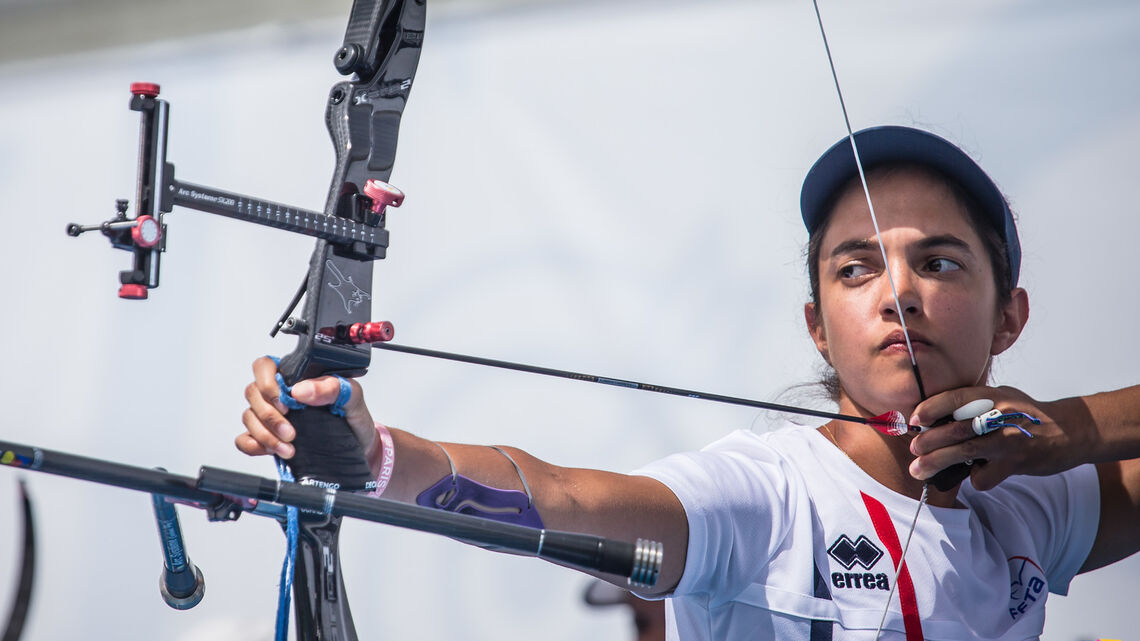
This blog is written by Audrey Adiceom, giving an insight into her life as an elite archer with the French national team.
I’ve trained every day at INSEP, the national sports centre in Paris, since September 2017.
On Friday 13 March 2020, all long-term residents received a note telling us that we had to leave the premises within two days and that we wouldn’t be allowed back for at least 15 days.
The first question I had was where I was going to live. And where I could live and continue to train.
Back at home in Riom, the local club had to close because of rules issued by the state. And I could be an asymptomatic carrier of COVID-19, so I didn’t want to stay with my parents who are more vulnerable.
Jean-Charles Valladont offered me a space at his house in the countryside. My boyfriend, who’s also a resident at INSEP, and a couple of friends were also invited.
His place is in Sologne, two hours south of Paris.

It was such a kind gesture. He owns a large piece of land that would allow us to train at 70 metres, like normal, as well as enjoy the fresh air of the countryside.
My days at Jean-Charles place have been very routine.
I usually shoot 100 arrows in the morning, focusing on technical work or score, after a breakfast of homemade bread and jam.
It’s crazy how, even alone in the middle of the countryside, my heart races in the more intense moments of a scored round. When I have five 10s in the target or when it’s the last end and I’m on for a good total.
Experiencing these feelings, even if they are a little less strong, is a real asset. It’s helping me for competitions and I’m working on my internal conversation and mental preparation, even here.
After practice, I take time to read a little and then start on my university work. I’m doing a masters in computer science for business at Paris Dauphine University.
Our courses were almost finished at the start of the confinement period but I hadn’t had time to take my end-of-semester exams. So, like the rest of my class, I’ve had to take them remotely.
Just after midday, we start to cook. The girls have been teaching me and I’ve loved it. We’ve cooked a huge variety of meals and try to make balanced menus.
We’ve made pies, fresh pasta, salads, sauces and pastries. All sorts.
During the second month of the lockdown, everyone wrote down their favourite dish and we prepared it over the next few weeks. There was everything: couscous, lasagne, salmon and spinach pasta, duck confit and, well, mine was cheese fondue.

In the afternoon, I work or help out in the garden if I don’t have to study.
At around 18h30, all the girls do an hour of sport – usually body weight training or yoga – before preparing dinner. I try to vary my exercise each day so I’m working my whole body.
We’ve gotten into the habit of doing a session of eight exercises lasting 20 seconds, repeating each exercise eight times, with 10 second break in between each. It’s a chance to let off a little steam while maintain a minimum level of physical conditioning.
In the evening, we eat together. We often watch a movie before going to bed. We’ve been watching the Marvel movies in storyline order, rather than release date.
Thor is my favourite.

Our sports coach at INSEP are running a twice-weekly video conference for the national team archers. Even though we’re all over France, we do a workout together. It’s the beauty of modern communication.
It’s good to see and laugh with my teammates. I have a Messenger group with all my archery friends and we send each other photos of our days.
They’re often photos of food but that’s because it’s another common passion!
Our sport only requires a target, a field and bow. Team sports, swimming and others that need more equipment are in a worse situation.
We’re lucky. We have beautiful weather and at Jean-Charles house, there is barely ever any wind. The atmosphere is friendly and fun. We challenge each other or we dedicate time to technical work.
With university work lessening, I’ll increase the amount of arrows I shoot. But it’s still quite relaxed.

At INSEP, we’re immersed in our Olympic preparation where everything is optimised and designed for high performance. The coaches present us a weekly schedule every Monday with group and individual training sessions.
During a normal week, I train for 25 hours, I have classes at the university or at INSEP (English) for 10 hours and every evening we have do structured exercise.
I see my psychologist or mental coach once a week to evaluate my development in this aspect of the sport. This is very important. The days and weeks are punctuated by archery with the group.
Today, I still think about preparing for the Olympics but as we don’t have competition until at least September, I can afford to do a little less archery.
It’s different not to have a coach around, too.
We still keep in touch about once a week. He asks me how I'm doing, what I’m working on, what I think of my shooting, what I do with my days. He also tries to find out if I'm keeping my spirits up and how motivated I am. It’s an essential phone call. It’s not much but it gives me an opportunity to talk about my training and what the future might hold at INSEP and for the team.
I try to call my parents, brother and grandmother once a week as well as well. It’s nice to have the time to call and really talk.
This confinement has not been a free vacation. What’s happening all over the world during this pandemic is very upsetting. I have felt it personally, too.
I lost my grandmother to the virus. She was a beautiful and great lady who had an inspiring life. I’m thankful that I had such a witty, intelligent and courageous grandmother. And she was so supportive of my archery.
As soon as competition started, she would log in to follow the results. She would send me an encouraging email before each tournament. She knew everyone, my archery friends, my opponents, even if they didn’t know her.
The best tribute I can pay her is to live my life to the fullest. A sports career is not for life so, while I’m doing my best in competition in the present, I’m going to make sure I set myself up for a future.

It has been a pleasure to take time on things during this period.
I’ve spent whole days studying or on a project for school, called my friends and family properly, prepared meals for longer, and even taken the time to do nothing.
Before, it was something I could do a few Sundays in the year. Now I can do it almost every day.
It was confusing at first, to have so much time for me. But I’m taking pleasure in the simple things. I think that’s going to be so beneficial for my personal and sporting development. I’m readjusting to see things at their true value.
I’ve not been bored. I’ve lived well during lockdown and I’ve been lucky.

I am focused, again, on the essence of my sport. I’ve asked myself important questions. Why do I do archery? Why keep practising when there is nothing to aim for? Why hope for success when no competition is being organised?
I do archery because I love the sport. You don’t play a game because you want to be world champion, you play because you love playing with friends and enjoy succeeding.
At the moment, my motivation is not competition but a desire to progress. I’ve set myself mini technical, mental and performance objectives.
Training takes on a different meaning but the results of my shooting remain good. It’s close to what I can do at INSEP, when I’m with the team. It’s very encouraging.
Content images courtesy of Audrey Adiceom.


